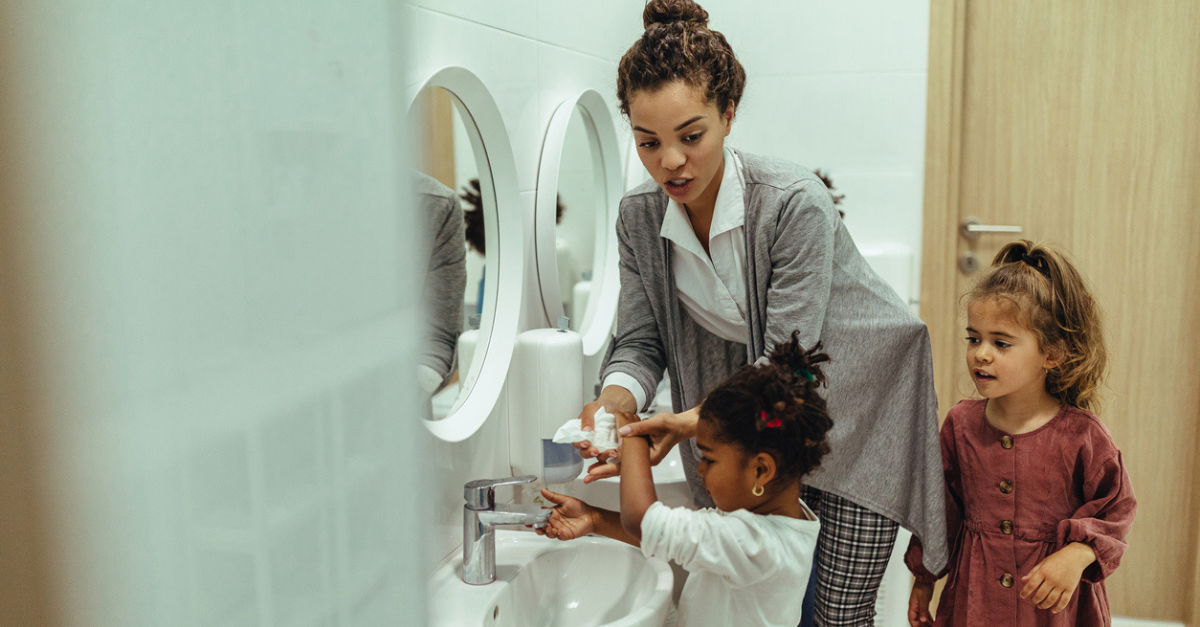Breaking the Barriers on Bathroom Passes
By Shannon Suarez, MSN, APRN, CPNP
The first question I always ask the children I see in our office is, “how often do you go to the bathroom at school?” Usually, they don’t even know! I often find myself walking them through an imaginary school day, pausing to say- did you use it after homeroom? Lunch? Recess? There are quite a few times, however, when they tell me that they don’t use it at school at all. Instead, they wait until they get home. I touch on those reasons briefly in my last post: Here’s the Scoop on Poop. Today, however, I am going to discuss why that is a problem, what is going on in our school system to contribute to this, and how to get the support you need to correct it.
Children spend about half their waking hours in school. Whether or not your child attends daycare or preschool before elementary, school is essentially where they learn their bathroom behaviors. A study completed in 2003 through the University of Iowa surveyed roughly 500 elementary school teachers to evaluate their current school bathroom conditions and policies, as well as the behaviors and experiences of their students. Eighty percent of the teachers reported set times for student bathroom breaks. More than half requested all children go to the bathroom at the set times. One-third asked a child requesting a break in the middle of class to wait. In short, this means kids are being encouraged, if not forced, to hold it in.
Dr. Christopher Cooper, the lead physician on this research project, explains, “Incontinence occurs because children hold off urinating. In addition, when kids get too good at holding off, they can’t relax enough to void when they have the opportunity, or they stretch their bladders and do damage”. He is correct. Furthermore, kids in these younger grades are still developing and have some unstable bladder contractions, leading to accidents with socially and psychologically devastating consequences. His study also found that kindergarten teachers were the most likely to give free access to the bathroom and to believe children who said they needed to go. However, this dropped to 40% for first grade and 25% by third grade, which is unusual as there is no physiological difference between five-, six-, and seven-year-olds in terms of voiding dysfunction, Dr. Cooper argues.
There is hope, though. His study found that the more teaching experience his respondents had, the more likely they were to identify a possible bladder problem and involve a school nurse. This means there is room for this kind of education in teacher programs and when there is room for education, there is room for change. Still, it is important to note that most teachers and school administrators have good reasons for their rules. Aside from simple distraction, the Iowa study also concluded that teachers are concerned that older children want to go to the bathroom for social or other reasons, or that children will be subjected to bullying or teasing by peers in an unsupervised place. Teachers also noted the lack of cleanliness of bathrooms. These are also reasons why kids skip the bathroom all day and wait for home, but we’ll touch more on that another time.
On average, children should try to use the bathroom every 2-3 hours, though age and condition may modify this a bit in either direction. Notice that I said try to use. This means they need to try even if they don’t feel the urge. (I’ll explain more about this in my next article To Go or Not to Go: That is the Question). Some of our patients are lucky to have teachers that allow the freedom to use the bathroom on demand, but it is not uncommon for me to hear about a teacher who just won’t budge. Georgia Urology can provide you with a letter of medical necessity that allows your child to use the bathroom on whatever schedule we determine necessary. I suggest making 3 copies of this letter and providing it to your child’s teacher, the school nurse, and the front office. This will prevent any communication errors among school staff. Many times, this letter is enough, but I have seen an upswing in the requirement of a 504 or IEP plan.
The above-mentioned plans acknowledge a physical or mental disability that interferes with the child’s ability to learn in a general education classroom. There are substantial differences between the two plans and you can learn more about them through the Georgia Department of Education. If your child does not struggle with any other issues, aside from urinary, a 504 should be sufficient. Depending on the level of severity, a 504 can do as little as requiring the school to allow on-demand access to a bathroom, to as much as allowing your child to “stop the clock” during tests if the urge strikes. Should your school require this, you will need to provide Georgia Urology with the forms to substantiate your child’s diagnosis and needs. Creating a 504 plan is a process that is completed with your family, various staff members from your school and/or district, and a coordinator. It requires face-to-face meetings and yearly reevaluation. Once your child’s issue has resolved, it can be terminated. If at any point in time, you feel your 504 provisions are not being honored, there are legal advocates available to help you navigate that. A great parent resource for learning more about these plans and your child’s rights can be found at https://www.p2pga.org/ .
If you have any more questions about breaking the barriers on bathroom passes, the pediatric urology experts at Georgia Urology are here to help. To make an appointment with Georgia Urology’s pediatric team, schedule online or call one of our office locations.
References
American Association for Advancement of Science (2003). Elementary schools need a lesson in bathroom breaks. Retrieved from https://www.eurekalert.org/pub_releases/2003-08/uoi-esn080803.php
Cooper CS, Abousally CT, Austin JC, Boyt MA, Hawtrey CE. Do public schools teach voiding dysfunction? Results of an elementary school teacher survey. J Urol. 2003;170(3):956-958. doi:10.1097/01.ju.0000075916.55446.ee
Chron’s and Cholitis Foundation (2020). FACT SHEET on school accommodation plans and inflammatory bowel disease. Retrieved from https://www.crohnscolitisfoundation.org/sites/default/files/2019-07/school-accommodation-12-16.pdf
Georgia Board of Education. Section 504: Guidance for Georgia Local Education Agencies. Retrieved from https://www.gadoe.org/Curriculum-Instruction-and-Assessment/Student-Support-Teams/Documents/GaDOESection504Guidance.pdf
Parent to Parent of Georgia (2020). Education advocacy. Retrieved from https://www.p2pga.org/roadmap/advocacy/education-advocacy/









